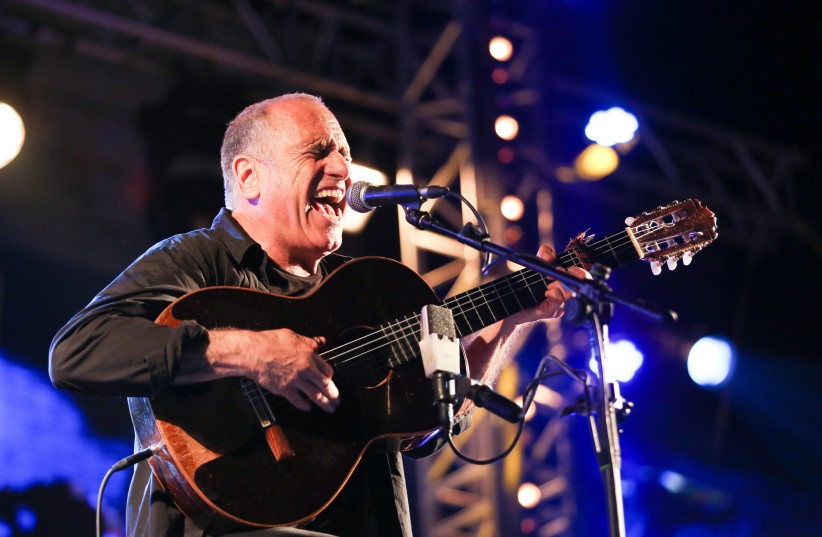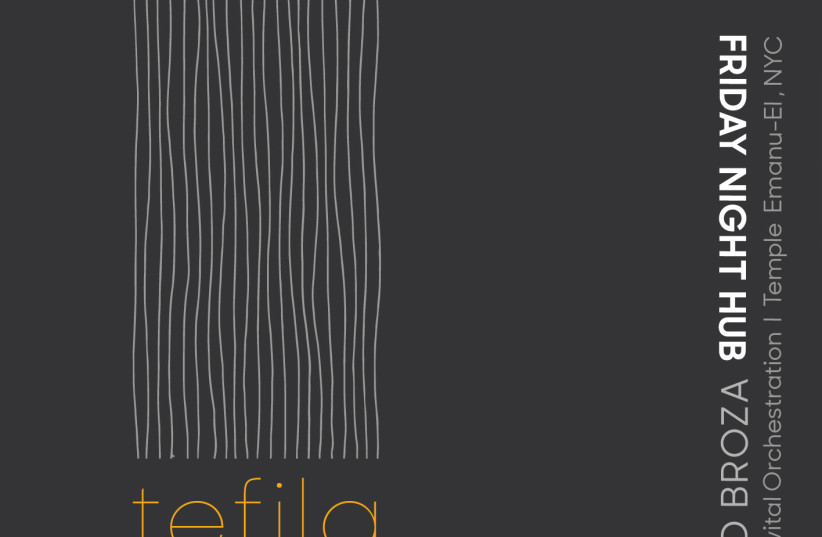It was a phone call that David Broza never expected to receive.
Some two years ago, just before the COVID pandemic hit the world, the renowned Israeli singer/songwriter was approached Dr. Gady Levy, the vice president of programs at New York’s flagship Reform synagogue Temple Emanu–El.
“He asked me if I’d be interested in composing new music for the Friday night prayer service,” recounted Broza this week from his home in Tel Aviv.
The secular musician, whose illustrious career in Hebrew, Spanish and English has encompassed folk, jazz, flamenco and rock over some 40 albums, was taken aback but intrigued.
“I’m not religious, but I’m proudly Jewish with respect for the traditions, but I didn’t know if I was the right person to do this,” said the 66-year-old Broza, who explained that the venerable shul was attempting to attract a younger crowd to its service and wanted to create a unique, irreverent experience that could eventually flourish throughout the Jewish world ala the much-loved tunes of Shlomo Carlebach or Debbie Friedman.

“When I expressed my reservations, Gadi asked me to look over the service and see if it inspired me.”
A few months into the pandemic and repeated quarantines, Broza finally got around to Levy’s request and discovered that, indeed, he was inspired.
“I read the first prayer for the lighting of the candles and I envisioned a liturgic piece of music that I grew up with when I lived in Spain. At the same time I was listening to Jimi Hendrix and The Band, I was also listening to Misa Criolla, the beautiful Spanish translation of the Catholic traditional liturgical text. It had choirs, ethnic instruments and was very folky. It was part of my inspiration,” said Broza, who added that he would have rejected the project if he had felt uncomfortable with it.

“It was all about if I could connect to the words and the prayers. And if something with integrity came through, then I would call this gentleman and tell him I was ready to do it. There are certain things I don’t want to taint because I may not be the right fit. I don’t lie to myself. But as I started to write, my wife Nili would poke her head in the door and say ‘wow, what’s this?’ I wrote it as I would any music, with integrity and totally true to me. It’s varied, from klezmer to Latin to gospel, jazz and rock – with a lot of energy.”
The selections include a salsa-infused “Shalom Aleichem” and a “L’cha Dodi” that, while totally new, fits right into the canon of the dozens of various well-known melodies to the prayer.
“I read the prayers as an Israeli would read Hebrew and I fell in love with them. The wording is poetic and beautiful, and I treated them the same way I would treat poems by Meir Ariel, Yehonatan Geffen or Alterman.”
Broza ended up writing 14 melodies in 14 days and let Levy know that the game was on. His next step was to find a musical partner who would arrange and orchestrate the pieces. Enter Israeli jazz great Omer Avital
“I was shopping in New York, and at that time due to COVID, restaurants couldn’t have indoor music, so Omer was performing outside and passing the hat. I couldn’t believe it. I stopped, listened, put some money in the hat and asked him if I could call him the next day about a project.”
Avital agreed to write the arrangements and helped Broza recruit the accompanying musicans.
“I had no clue that he would be such a great asset. He loves liturgical music and the classics, and he’s a stunning musician himself.”
The result is Tefila, a new album that combines Broza’s signature inventive melodies and the traditional prayer lyrics with orchestral arrangements and bass by Avital, enhanced by string and horn sections, plus the 25-piece Moran Singers Ensemble in Israel, as well as gospel singers from New York.
It will be released globally on all platforms on April 22.
“Omer brought in these great young Israeli musicians in their 20s and I started singing “Misheberach Adonay Eloheinu” and to them, it didn’t sound foreign or an ancestral thing, it sounded Hebrew. They were blown away, texting their parents back in Israel ‘you wouldn’t believe it, I’m working with Broza on liturgical songs.’”
Broza and all the musicians on the record will debut the music in a live setting on May 6 at the synagogue’s Friday Night Hub Shabbat service for young professionals and will stage subsequent performances on the next eight first Fridays of every month.
“This is an endeavor and a new experience for me. I’m really excited about bringing it onstage for the first time,” said Broza, who added that Temple Emanu-El would distribute the album to synagogues who request it, along with sheet music for those who want to adapt the material for their own kabalat shabbats.
Despite the embellishments of the full band and singers, Broza stressed that the material was written to be performed in any configuration.
“It all starts and ends with the voice and guitar. You can bring in 80 musicians to dress it up with beautiful arrangement, but if you strip it down, it still works.”
Summing up Tefila, Broza called it “completely unexpected. But, I’m old enough now to understand where the beauty in life lies.”
